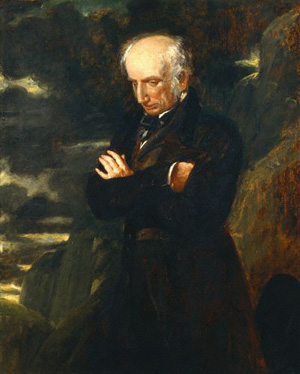Lines left upon a seat
William Wordsworth
Left upon a Seat in a Yew-tree, which stands near the lake of Esthwaite, on a desolate part of the shore, commanding a beautiful prospect.
NAY, Traveller! rest. This lonely Yew-tree stands
Far from all human dwelling: what if here
No sparkling rivulet spread the verdant herb?
What if the bee love not these barren boughs?
Yet, if the wind breathe soft, the curling waves,
That break against the shore, shall lull thy mind
By one soft impulse saved from vacancy.
Who he was
That piled these stones and with the mossy sod
First covered, and here taught this aged Tree
With its dark arms to form a circling bower,
I well remember.--He was one who owned
No common soul. In youth by science nursed,
And led by nature into a wild scene
Of lofty hopes, he to the world went forth
A favoured Being, knowing no desire
Which genius did not hallow; 'gainst the taint
Of dissolute tongues, and jealousy, and hate,
And scorn,--against all enemies prepared,
All but neglect. The world, for so it thought,
Owed him no service; wherefore he at once
With indignation turned himself away,
And with the food of pride sustained his soul
In solitude.--Stranger! these gloomy boughs
Had charms for him; and here he loved to sit,
His only visitants a straggling sheep,
The stone-chat, or the glancing sand-piper:
And on these barren rocks, with fern and heath,
And juniper and thistle, sprinkled o'er,
Fixing his downcast eye, he many an hour
A morbid pleasure nourished, tracing here
An emblem of his own unfruitful life:
And, lifting up his head, he then would gaze
On the more distant scene,--how lovely 'tis
Thou seest,--and he would gaze till it became
Far lovelier, and his heart could not sustain
The beauty, still more beauteous! Nor, that time,
When nature had subdued him to herself,
Would he forget those Beings to whose minds,
Warm from the labours of benevolence,
The world, and human life, appeared a scene
Of kindred loveliness: then he would sigh,
Inly disturbed, to think that others felt
What he must never feel: and so, lost Man!
On visionary views would fancy feed,
Till his eye streamed with tears. In this deep vale
He died,--this seat his only monument.
If Thou be one whose heart the holy forms
Of young imagination have kept pure,
Stranger! henceforth be warned; and know that pride,
Howe'er disguised in its own majesty,
Is littleness; that he, who feels contempt
For any living thing, hath faculties
Which he has never used; that thought with him
Is in its infancy. The man whose eye
Is ever on himself doth look on one,
The least of Nature's works, one who might move
The wise man to that scorn which wisdom holds
Unlawful, ever. O be wiser, Thou!
Instructed that true knowledge leads to love;
True dignity abides with him alone
Who, in the silent hour of inward thought,
Can still suspect, and still revere himself
In lowliness of heart.
1795.
Wordsowrth's Introduction: Composed in part at school at Hawkshead.
The tree has disappeared, and the slip of Common on which it stood, that ran parallel to the lake, and lay open to it, has long been enclosed; so that the road has lost much of its attraction.
This spot was my favourite walk in the evenings during the latter part of my school-time.
The individual whose habits and character are here given, was a gentleman of the neighbourhood, a man of talent and learning, who had been educated at one of our Universities, and returned to pass his time in seclusion on his own estate.
He died a bachelor in middle age. Induced by the beauty of the prospect, he built a small summer-house on the rocks above the peninsula on which the ferry-house stands.
This property afterwards passed into the hands of the late Mr. Curwen. The site was long ago pointed out by Mr. West in his Guide, as the pride of the lakes, and now goes by the name of "The Station."
So much used I to be delighted with the view from it, while a little boy, that some years before the first pleasure-house was built, I led thither from Hawkshead a youngster about my own age, an Irish boy, who was a servant to an itinerant conjuror.
My motive was to witness the pleasure I expected the boy would receive from the prospect of the islands below and the intermingling water.
I was not disappointed; and I hope the fact, insignificant as it may appear to some, may be thought worthy of note by others who may cast their eye over these notes.
